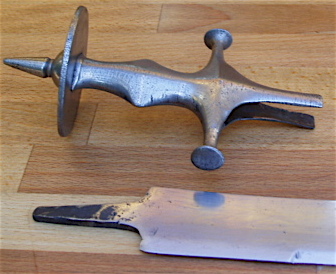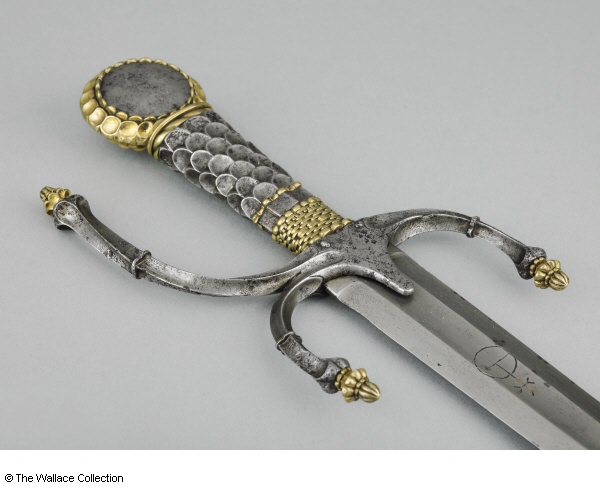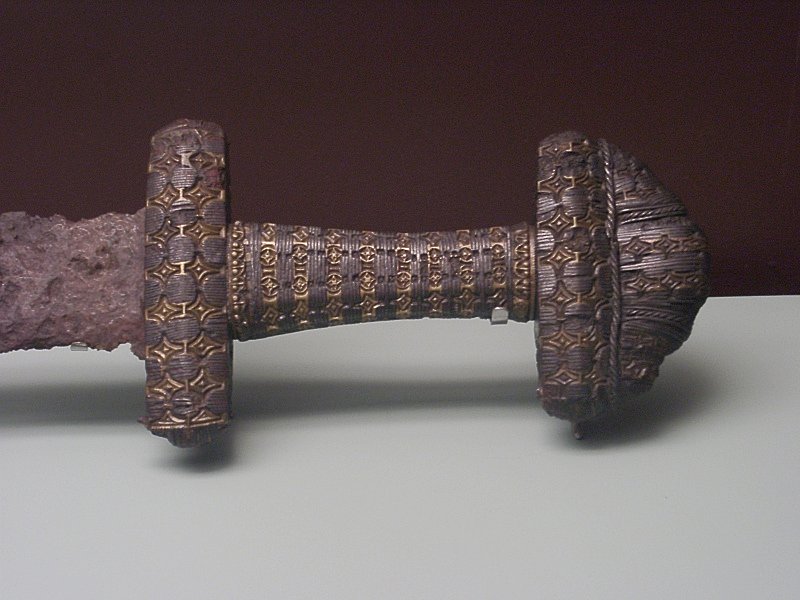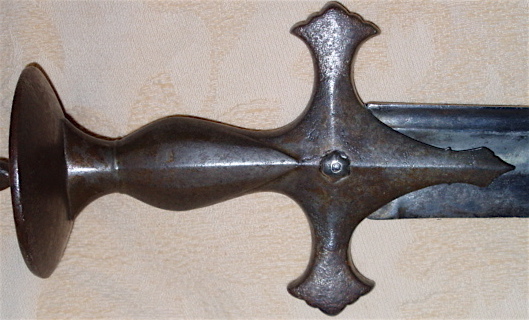I am looking for examples of all-metal sword and dagger hilts, particularly cut iron/steel but also bronze or latten hilts.
I have never paid much attention to these in the past but am becoming more and more curious about how they were constructed, and how the obvious weight factor was mitigated. It seems likely that some of these pieces were made with hollow interiors to keep the weight within reason. I am hoping there are some folks here who have handled or documented some of these weapons and can offer some first-hand impressions.
The Dublin civic sword apparently was a royal (field?) sword before being re-fit by a silversmith when it was granted to Dublin. It has a silver grip (solid or plate-over-wood, I don't know). That's one of the earliest examples I can think of, but, of course, it was not meant for combat.
Some Katzbalgers are all-steel/iron except for a small section of wood or horn in the center of the grip.
By 1600, at least, there were all-metal hilts, and those persisted up through the mid-19th c. The British hangers of ca. 1700-1750 are probably the best-known examples.
Some Katzbalgers are all-steel/iron except for a small section of wood or horn in the center of the grip.
By 1600, at least, there were all-metal hilts, and those persisted up through the mid-19th c. The British hangers of ca. 1700-1750 are probably the best-known examples.
16th C hilts that are all steel (sometimes with lavish inlay of silver & gold) were constructed in parts: pommel and guard like normal, while the grip was fashioned from iron sheet metal.
Normally an all bronze hilt would be cast hollow in lost wax method (building a wax model on a ceramic core, that can be cleaned out after the pouring is done.
Islamic all-metal hilts are often skillfully made from many parts brazed or welded together.
Solid metal hilts would be rare, because of those weight factors you mentioned.
Normally an all bronze hilt would be cast hollow in lost wax method (building a wax model on a ceramic core, that can be cleaned out after the pouring is done.
Islamic all-metal hilts are often skillfully made from many parts brazed or welded together.
Solid metal hilts would be rare, because of those weight factors you mentioned.
There are some early Bronze Age daggers constructed with all metal hilts, I've seen some Roman pugios with bronze hilts, there are any number of small African knives made from one piece of metal, Indian weapons all over the place (katar anyone?), and a lot of dueling swords look to be all metal as well.
Also, see these recent threads:
http://www.myArmoury.com/talk/viewtopic.php?t=15926
http://www.myArmoury.com/talk/viewtopic.php?t=16016
In the first there are some metal-hilted trench daggers and in the second there is mention of swords with decorated tangs which suggests there was no hilt and the tang was grasped directly.
In short, throw a stick and you'll hit several all-metal weapons. Don't get me started on the various all-metal axes and maces out there. ;)
Edit: Don't forget, a lot of throwing knives, particularly the modern ones, are all one piece of metal.
Double-Edit for lousy grammer....
Also, see these recent threads:
http://www.myArmoury.com/talk/viewtopic.php?t=15926
http://www.myArmoury.com/talk/viewtopic.php?t=16016
In the first there are some metal-hilted trench daggers and in the second there is mention of swords with decorated tangs which suggests there was no hilt and the tang was grasped directly.
In short, throw a stick and you'll hit several all-metal weapons. Don't get me started on the various all-metal axes and maces out there. ;)
Edit: Don't forget, a lot of throwing knives, particularly the modern ones, are all one piece of metal.
Double-Edit for lousy grammer....
This one is shown a few times in the photo album:
http://www.myArmoury.com/albums/photo/760.html
[ Linked Image ]
The whole hilt is metal and appears to be solid, handle and pommel included.
http://www.myArmoury.com/albums/photo/760.html
[ Linked Image ]
The whole hilt is metal and appears to be solid, handle and pommel included.
Just check out our articles section:
Both of these:
[ Linked Image ]
The top one:
[ Linked Image ]
All of these:
[ Linked Image ]
The top one (and maybe the bottom one):
[ Linked Image ]
This nice one:
[ Linked Image ]
How about this?
[ Linked Image ]
Or this?
[ Linked Image ]
Both of these:
[ Linked Image ]
The top one:
[ Linked Image ]
All of these:
[ Linked Image ]
The top one (and maybe the bottom one):
[ Linked Image ]
This nice one:
[ Linked Image ]
How about this?
[ Linked Image ]
Or this?
[ Linked Image ]
Or our reviews section:
[ Linked Image ]
[ Linked Image ]
[ Linked Image ]
Or our collection galleries:
[ Linked Image ]
And the sword from the Met it's based on:
[ Linked Image ]
I'm sure there are more scattered around as well. :) The later you go in history, the more you find it (usualluy).
[ Linked Image ]
[ Linked Image ]
[ Linked Image ]
Or our collection galleries:
[ Linked Image ]
And the sword from the Met it's based on:
[ Linked Image ]
I'm sure there are more scattered around as well. :) The later you go in history, the more you find it (usualluy).
Hello Justin,
A new example for hollow grip:
A medieval dagger (around 1300, private collection) with hilt made from two halves of no-ferrous metal, here it is copper. You can also find leavings of gilding.
Around 1600 circa to the mid of 17th century there are some sabres from Italy (Storta) with hilts made by two halves of iron, surely not for rich men. Types were discussed here at myArmoury.com
http://www.myArmoury.com/talk/viewtopic.php?t...ght=storta
http://www.czernys.com/auctions_lot.php?oggetto=26777&asta=22
The rondel dagger (private collection) is around 1450, grip is made from brass, probably not hollow.
Chad, you have shown many of my favorites! Can you tell me something about the medieval sword, last one from your first posting?
Kind regards
 Attachment: 4.11 KB
Attachment: 4.11 KB

 Attachment: 7.77 KB
Attachment: 7.77 KB

A new example for hollow grip:
A medieval dagger (around 1300, private collection) with hilt made from two halves of no-ferrous metal, here it is copper. You can also find leavings of gilding.
Around 1600 circa to the mid of 17th century there are some sabres from Italy (Storta) with hilts made by two halves of iron, surely not for rich men. Types were discussed here at myArmoury.com
http://www.myArmoury.com/talk/viewtopic.php?t...ght=storta
http://www.czernys.com/auctions_lot.php?oggetto=26777&asta=22
The rondel dagger (private collection) is around 1450, grip is made from brass, probably not hollow.
Chad, you have shown many of my favorites! Can you tell me something about the medieval sword, last one from your first posting?
Kind regards


I think its earlier than you mean, but how about this 6th century AD akinakes? Its a replica but a very nice one. Weight isn't an issue, and it feels surprisingly comfortable in the hand.
Hi,
Tulwars/Talwars from the Indian subcontinent have for many centuries been constructed with hollow steel/iron, occasionally brass/bronze, hilts which are filled with a natural resin which is soft when heated but incredibly strong with a fantastic grip when at normal temperatures. The blades of these swords have a shorter tang than one would think but it is perfectly sufficient for a solid and durable anchor. Sometimes a small pin is inserted through the hilt as an extra measure but swords with this attribute tend to be area specific i.e. Northern India and Afghanistan. The photograph is of a blade and dismounted hilt from a restoration project. Hope this is of some interest.
Regards,
Norman.
 Attachment: 57.16 KB
Attachment: 57.16 KB

Tulwars/Talwars from the Indian subcontinent have for many centuries been constructed with hollow steel/iron, occasionally brass/bronze, hilts which are filled with a natural resin which is soft when heated but incredibly strong with a fantastic grip when at normal temperatures. The blades of these swords have a shorter tang than one would think but it is perfectly sufficient for a solid and durable anchor. Sometimes a small pin is inserted through the hilt as an extra measure but swords with this attribute tend to be area specific i.e. Northern India and Afghanistan. The photograph is of a blade and dismounted hilt from a restoration project. Hope this is of some interest.
Regards,
Norman.

Hilt- Italy, possibly Brescia, blade- Germany
Hilt 2nd quarter of 17th century, blade probably 16th century (hilt (Italian))
probably 16th century (blade (German))
Iron or steel, bronze, gold, copper and copper alloy, chased and chiselled
Length: 91 cm, blade
Width: 3.3 cm
Weight: 0.84 kg
Maker's mark: Orb and cross Inlaid in copper
A524
European Armoury I
 Attachment: 91.67 KB
Attachment: 91.67 KB

Hilt 2nd quarter of 17th century, blade probably 16th century (hilt (Italian))
probably 16th century (blade (German))
Iron or steel, bronze, gold, copper and copper alloy, chased and chiselled
Length: 91 cm, blade
Width: 3.3 cm
Weight: 0.84 kg
Maker's mark: Orb and cross Inlaid in copper
A524
European Armoury I

| Sabine Benning wrote: |
| Chad, you have shown many of my favorites! Can you tell me something about the medieval sword, last one from your first posting?
|
That sword is pictured in our article: Spotlight-Oakeshott Type XVII Swords
| Quote: |
| XVII.3 From the Corporation of the City of Bristol
Thought to have had a working life between 1380 and 1400, it was presented in its present form to the city of Bristol in the 1430s. The hilt is of silver-gilt and the decorations on it were applied so that they were best viewed with the point held up, similar to a bearing sword. It has a 38" long blade and its cross-guard is identical to the Battle Abbey Sword (1403) found in the Royal Scottish Museum, Edinburgh. |
| Sean Flynt wrote: |
| Hilt- Italy, possibly Brescia, blade- Germany
Hilt 2nd quarter of 17th century, blade probably 16th century (hilt (Italian)) probably 16th century (blade (German)) Iron or steel, bronze, gold, copper and copper alloy, chased and chiselled Length: 91 cm, blade Width: 3.3 cm Weight: 0.84 kg Maker's mark: Orb and cross Inlaid in copper A524 European Armoury I |
I like :D . I can't really say why, but I do.
Cheers,
Here is one that keeps looking at me with that daring expression of "what? You want to make me don't you?" Or maybe it's me always looking at it thinking "Man, I want to make you"
 Attachment: 77.95 KB
Attachment: 77.95 KB


Thanks for all the replies and examples, guys. There are some really stunning pieces among these, that Viking hilt in particular is awesome, I don't think I have ever seen that one.
I have been approached about doing a couple of custom daggers recently that may involve all-steel hilts (I think-sometimes it's hard to tell from pictures), and I have been trying to wrap my mind around the concept as it seems contrary to me for many reasons, including weight/balance, comfort, grip-ability, and corrosion from contact with the skin in the case of iron/steel. On the other hand they are often very attractive, to the point that I wonder in some cases whether they were really meant for any earnest use, so to speak, or if they were intended more as a display of skill on the part of the maker, or taste on the part of the owner (or both).
I have been approached about doing a couple of custom daggers recently that may involve all-steel hilts (I think-sometimes it's hard to tell from pictures), and I have been trying to wrap my mind around the concept as it seems contrary to me for many reasons, including weight/balance, comfort, grip-ability, and corrosion from contact with the skin in the case of iron/steel. On the other hand they are often very attractive, to the point that I wonder in some cases whether they were really meant for any earnest use, so to speak, or if they were intended more as a display of skill on the part of the maker, or taste on the part of the owner (or both).
Hi Justin,
Although there is no doubt that all metal hilts have been used as embellishment I can assure you that the Indian Tulwar/Talwar is very much a fighting sword it has even been proposed that the British 1796 Light Cavalry Sabre was based on Tulwar Sabres of the period. Most Tulwars have sabre type blades for slashing therefore the blade has to be securely anchored to the hilt which is done, as I said previously, with resin and sometimes resin and a single pin. The attached photos are of 150/200 year old fighting swords, one showing the pin arrangement, they are both still solid in the hilt and comfortable in the hand. In general Indian hands are slightly smaller than European therefore if you should have the opportunity to handle a decent Tulwar you will probably find the grip rather on the small side. Many Indian hilts were embellished with Gold and/or Silver Koftgari, one of my examples has some of this silver decoration still intact. A large proportion of weapons of various kinds from the Indian Sub-Continent have iron/steel hilts/grips and have been used successfully for hundreds of years therefore although they can display the smiths art they were primarily meant for business. I hope this is of some use in your research.
Regards,
Norman.
 Attachment: 97.05 KB
Attachment: 97.05 KB

Although there is no doubt that all metal hilts have been used as embellishment I can assure you that the Indian Tulwar/Talwar is very much a fighting sword it has even been proposed that the British 1796 Light Cavalry Sabre was based on Tulwar Sabres of the period. Most Tulwars have sabre type blades for slashing therefore the blade has to be securely anchored to the hilt which is done, as I said previously, with resin and sometimes resin and a single pin. The attached photos are of 150/200 year old fighting swords, one showing the pin arrangement, they are both still solid in the hilt and comfortable in the hand. In general Indian hands are slightly smaller than European therefore if you should have the opportunity to handle a decent Tulwar you will probably find the grip rather on the small side. Many Indian hilts were embellished with Gold and/or Silver Koftgari, one of my examples has some of this silver decoration still intact. A large proportion of weapons of various kinds from the Indian Sub-Continent have iron/steel hilts/grips and have been used successfully for hundreds of years therefore although they can display the smiths art they were primarily meant for business. I hope this is of some use in your research.
Regards,
Norman.

Page 1 of 1
You cannot post new topics in this forumYou cannot reply to topics in this forum
You cannot edit your posts in this forum
You cannot delete your posts in this forum
You cannot vote in polls in this forum
You cannot attach files in this forum
You can download files in this forum
All contents © Copyright 2003-2006 myArmoury.com — All rights reserved
Discussion forums powered by phpBB © The phpBB Group
Switch to the Full-featured Version of the forum
Discussion forums powered by phpBB © The phpBB Group
Switch to the Full-featured Version of the forum